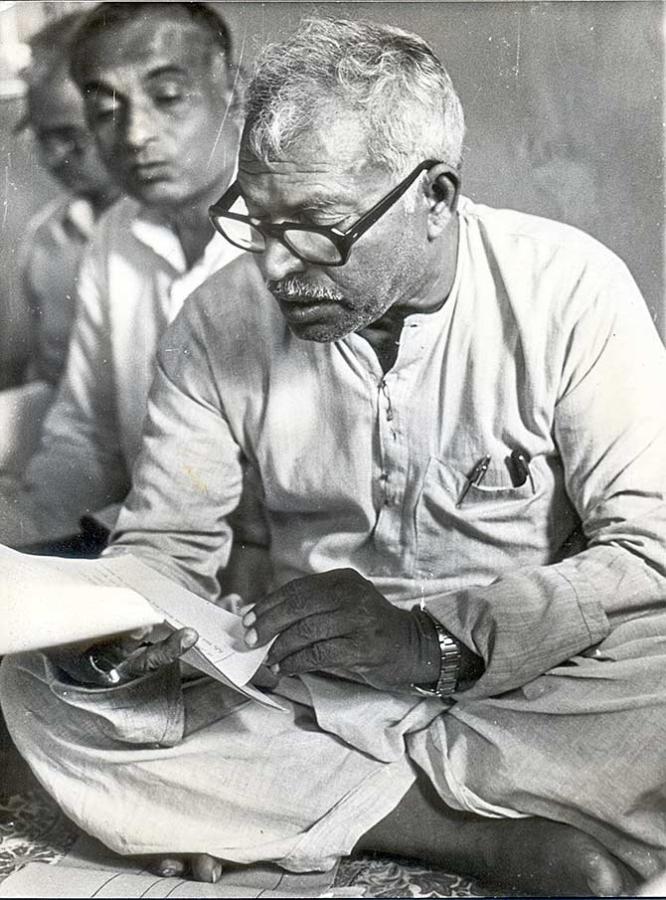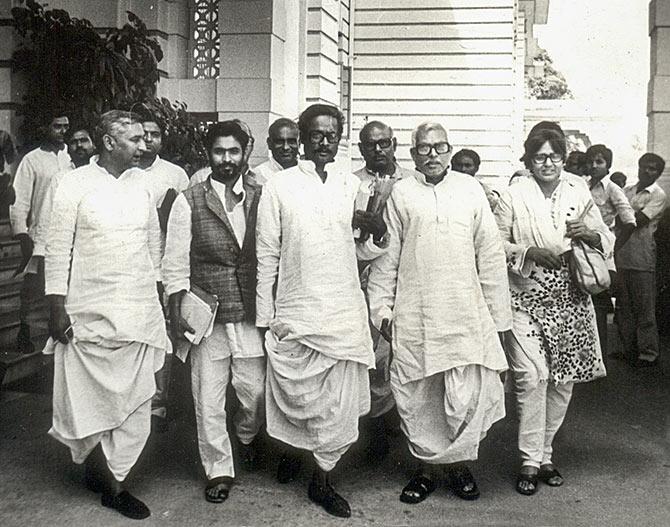'Despite being Bihar chief minister twice and an MLA for over three decades, he and my mother used to stay in a jhopri in our village.'

A day after President Droupadi Murmu announced that India would confer the Bharat Ratna, the country's highest civilian honour, posthumously on Socialist leader and former Bihar chief minister Karpoori Thakur, his family -- sons, daughter and grandchildren -- are delighted.
Family members have been invited to meet Prime Minister Narendra Damodardas Modi after January 26. They will visit New Delhi to say "dhanyawad" to the prime minister.
"My father was not a simple politician or leader, he was the messiah of the poor, downtrodden and marginalised in society. He never cared to earn and deposit money for the family, never built a house, his main concern and focus was to work for the betterment of poor. He is rightly named Jan Nayak," says Dr Virender Thakur, Karpoori Thakur's youngest son.
Karpoori Thakur was chief minister of Bihar from December 1970 to June 1971 and from December 1977 to April 1979. He passed away in 1988.
"It is an emotional moment for all of us, we cannot express it in words. We are feeling proud and thankful to Modiji," Dr Thakur, who retired from government service as a doctor, adds.
"He should be given the Bharat Ratna long ago," Dr Thakur says, adding that then Bihar chief minister Lalu Prasad Yadav had appealed to the Centre for years that Karpoori Thakur be awarded the Bharat Ratna.

Neither Nitish Kumar nor Lalu nor any other leader in Bihar, Dr Thakur asserts, can be Karpoori Thakur's political successor.
"At present there is no such leader in Bihar or outside. It is difficult to find a Garib Ka Massiah like Karpoori Thakur these days. My father was an honest politician who had no house of his own, he never cared to promote his family in politics."
Dr Thakur recalled that his father asked him to become a doctor to help the poor.
"After I completed my MBBS, he encouraged me to join a government hospital to serve the poor instead of doing anything connected with politics. He always motivated me to work for the poor by helping them with treatment in hospital."
"When I was very ill in my childhood and doctors in Delhi advised an operation to save my life, my father refused to take any help from then prime minister Indira Gandhi for it. He said he would not take government help even if his son died. Jayaprakash Narayan then arranged help for my treatment."
Ramnath Thakur, his elder brother, joined politics only after his father's death, Dr Thakur added.

"We have been expecting it for years," says Kanak Lata Thakur, Dr Thakur's wife, "finally, my sasurji (father-in-law) is a Bharat Ratna."
Kanak Lata, who teaches in a government college, says her husband refused to enter politics 25 years ago when he was invited to do so because he was in government service.
"Now my husband is retired, he is keen to join politics. If an offer comes to us, any of us from my family -- my husband, me or my son -- can join politics," says Karpoori Thakur's daughter-in-law.
Both her children -- a son and daughter -- are doctors.
When asked which political party they would like to join, Kanak Lata says, "Any political party. We have not yet decided."
"Humko BJP se bhi offer aayega to hum jayenge. Agar JD-U ya RJD se pahle offer aya to bhi achcha hai (If the BJP makes an offer we will go. If the JD-U or RJD make an offer first, it would be good)."
"Karpoori Thakur was abused, humiliated and targeted for his reservation formula," remembers Kanak Lata. "Powerful sections of society used to abuse him with vulgar and filthy words that can't be repeated here. But he hardly cared for such abuse and vigorously worked till the last.".
Twice, she added, Karpoori Thakur's governments in Bihar fell because of the Jan Sangh, the BJP's parent.
Ramnath Thakur, Karpoori Thakur's elder son, is a JD-U member of the Rajya Sabha. "The Bharat Ratna is the outcome of a 36 year demand," he says. "My party the JD-U and our leader Nitish Kumar never missed an opportunity to demand the Bharat Ratna for my father."
"We were confident that the Bharat Ratna would one day be awarded to him, we were not sure when it would be conferred," Ramnath Thakur adds.
"It is impossible to imagine that despite being Bihar chief minister twice and an MLA for over three decades, there was no pucca makan in our native village in Samastipur district," says Ramnath Thakur.
"He and my mother used to stay in a jhopri (hut) in the village during his visits till he died. Only after his death was the jhopri developed as his Smriti Bhawan."

Belonging to the extremely backward castes (EBC), Karpoori Thakur has emerged as an important icon for consolidating EBC votes in caste-ridden Bihar.
The EBCs are a cluster of over a dozen castes accounting for around 37 per cent of the population as per the caste survey conducted by Nitish Kumar's government.
Feature Presentation: Aslam Hunani/Rediff.com










